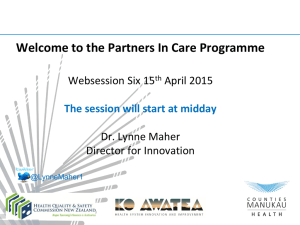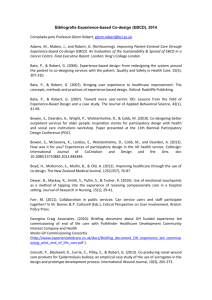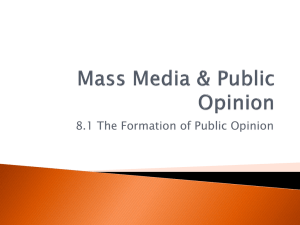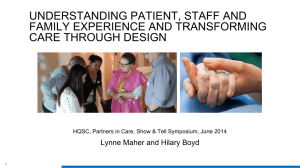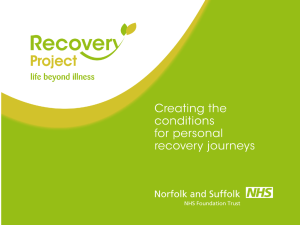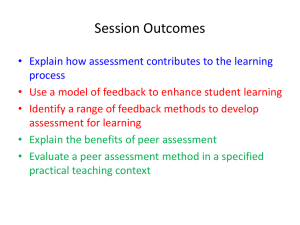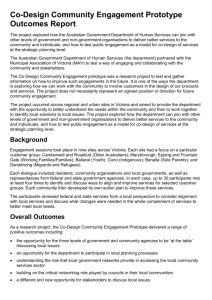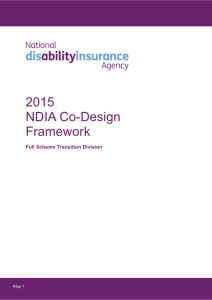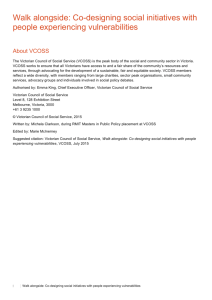Partnership
advertisement
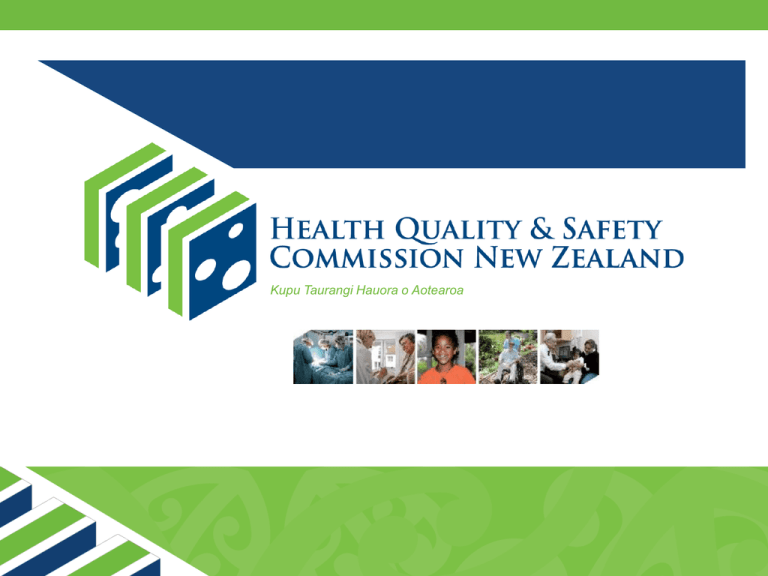
Kupu Taurangi Hauora o Aotearoa Health and Disability Consumer Representative Training MODULE FOUR Partnership Welcome and introductions Who you are Where you’re from What you want to get out of the training today • The NZ health and disability environment • Defining consumers • Quality improvement • Consumer engagement • Leadership • Co-design • Peer support • Your experience • Roles & responsibilities • Meetings 1. Health and disability context 2. Experience base 4. Partnership 3. Evidence base • Inequities • Research • Clinical trials Partnership Health and disability context • Leadership • Co-design • Peer support Partnership Experience base Evidence base Goals for the day • To understand what it means to be a leader and provide leadership as a health and disability consumer representative. • To have an understanding of co-design and how you can use it. • To have an understanding of what peer support means and how this can work for you. Leadership ‘Leadership is one of the most widely researched phenomena in the social sciences with no agreement on a single definition and has come to mean all things to all people.’ Consumer Leadership: A Literature Review (2007) www.health.vic.govt/qualitycouncil ‘If leaders want to alter the perception that they alone have all the answers, hashed out in some corner office, they must become a regular, approachable, and authentic presence throughout the organization. Discussions in the hallways talking with staff, and learning from patients and patient stories, need to become the norm.’ Gary, Yates, Sacks, Feeley, Kabcenell (2013) http://www.ihi.org/resources/Pages/AudioandVideo/WIHINewLeaders hipSkillsforBetterHealthandHealthCare.aspx Leadership defined • A leader is a person with the ability to inspire, motivate, lead or influence others. • Leaders stir people’s emotions, raise their expectations and take them in new directions. • ‘Leadership is about setting a strategic direction or vision, concern with changing the status quo, and energizing of others to act.’ Consumer Leadership: A Literature Review (2007) http://www.health.vic.gov.au/qualitycouncil/downloads/cl_literature_review.pdf Fifteen Personal Qualities Essential for Leadership (NHS Leadership Qualities Framework, 2006) 1. Setting direction: • seizing the future • intellectual flexibility • broad scanning • political astuteness • drive for results. 2. Delivering the service: • leading change through people • holding to account • empowering others • effective and strategic influencing • collaborative working. 3. Personal qualities: • self-belief • self-awareness • self-management • drive for improvement • personal integrity. (www.NHSLeadershipQualities.nhs.uk) • Consumer leadership in health can be inherent in many people, and can emerge and be developed given the right combination of an enabling environment and appropriate support, including training. • Consumer leadership requires support and mentors from all sectors to guide effective change and build leadership skills. (www.kites.org.nz) Enablers and barriers to consumer leadership Enablers Barriers 1. Health professionals value the consumer leader’s knowledge and experience. 1. Health professionals view participation as seeking information from consumers vs a partnership to decision-making. 2. Health professionals work in partnership with the consumer representative. 2. Communication may not be inclusive. 3. Developing consumer participation is a continuous process. 3. Lack of understanding/resistance to partnering with consumers. 4. Consumer focused throughout the organisation. 4. Difficulty locating or recruiting consumer representatives. Te Pou consumer leadership development grant • Consumer leadership development grants are available to assist consumer participation in leadership development. • Any organisation funded by the disability support service group of the Ministry of Health can apply, either on behalf of a consumer or in sponsorship of others. (email: disability@tepou.co.nz for an application form or go to: www.tepou.co.nz Group exercise What are the skills, knowledge and experience needed to be a consumer leader? What is health service co-design? • Capturing and understanding consumer, family/ whānau and health care providers’ experiences of the health care system and then working together to improve them. • Working together in equal partnership to identify issues and improvement opportunities. • Working together on designing and developing real projects to improve the service. Co-design principles Equity: an equal relationship with consumers throughout the improvement process. Understanding: engaging with, listening to and understanding consumer experiences. Improving: using co-research and design methods to improve services. (Bate & Robert 2006) Six phases of co-design Co-design practices Prioritise the consumer experience: Keep the consumer central and support their contributions throughout. Trust the process: The results of collaboration make it well worth stepping outside your comfort zone. Be sustainable: Ensure your project is fully supported over time. Be ethical: Address ethics committee requirements and use informed consent. (Bate & Robert 2006) Co-design partnership The value of having consumers and their families involved in improvement initiatives can make service design safer, quality more effective and satisfaction more reliable. Adapted from Patient and family advisors: Getting the most out of your partnership (www.ihi.org) Useful websites Online library of quality and service improvement tools: www.institute.nhs.uk A 2013 revised and extended free-to-access online EBCD toolkit: www.kingsfund.org.uk/projects/ebcd Information about experience-based design: www.institute.nhs.uk/ebd Working with patients to improve health care: www.kingsfund.org.nz/ebcd/ Peer support: What does this mean? Peer support is a system of giving and receiving help founded on key principles of respect, shared responsibility and mutual agreement of what is, or can be, helpful. (www.peersupport.org) Peer support, supervision, mentoring, counselling: What’s the difference? Supervision: A structural relationship where a practitioner reflects critically on their work and receives feedback/guidance from a trained supervisor in order to provide the best service to consumers. (http://www.otboard.org.nz/Supervision/Definitionofsupervision.aspx) Mentoring A developmental partnership where one person shares knowledge, skills, information and perspectives to foster personal and professional growth of the other. It is a two-way relationship. (http://cmcismentorprogram.wordpress.com/mentoring-programmanual/definition-of-mentoring) Counselling A therapeutic relationship where a trained counsellor gives guidance on personal or psychological problems using trained methods and techniques to help people with their problems. It is not an equal relationship nor reciprocal. Cultural supervision A professional relationship between members of the same culture to ensure the supervisee is practising according to the values, protocols and practices of that particular culture. It is about accountability and cultural development. (Eruera 2005) Kaupapa Māori supervision An agreed supervision relationship between Māori for Māori, to enable the supervisee to achieve safe and accountable professional practice, cultural development and self-care according to the philosophy, principles and practices from a Māori world view. (Eruera, 2005) Peer support embodies: • reliance on the expertise of shared experience • recovery in the sense of wellbeing and independence • self-care and self-determination • a life well lived even with the limitations of illhealth • talking to somebody who understands the language they use to describe their feelings – the ‘ah-ha’ moment • using personal experience to help others. How peer support can work for you • Helps improve coping skills. • Gives reassurance and a sense of normalcy. • Reduces isolation, particularly for those consumers on their own in a working group. • Provides opportunities to share information. • Improves understanding of the experience. • Gives greater confidence in talking to health professionals. A peer support ‘contract’ • Mutually agreed time to meet and talk – how long? • Give feedback on issues discussed. • Maintain confidentiality. • Others? Group to include. Summary • Leadership has many meanings and is particular to each individual but requires group participation with a shared vision. • Co-design is about working together collaboratively as equal partners to improve the health care system. • Peer support is essential for self-care and self-determination – and a shared experience. Questions? Comments? Evaluation
